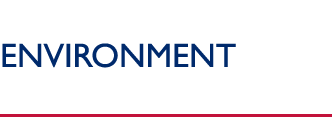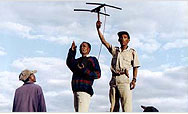Senegal
USAID’s climate change activities in Senegal focus on building the capacity of local communities to manage their natural resources. The program provides training and economic incentives to improve community-based natural resource management and also guidance for farmers on regenerating lost forest lands. By helping to restore and preserve Senegal’s carbon sinks, these activities are mitigating the effects of climate change.
Background

Like its neighboring countries in the Sahel, Senegal was hit by a serious drought in the late 1960s. Since that time, Senegal’s ecology has changed under the influence of dramatic threats to the environment. Average annual rainfall and agricultural production have decreased, livestock mortality has increased, and the country’s forest resources are disappearing.
Sector-Specific Climate Change Activities
To address this situation, USAID supports Senegal’s efforts to increase forest cover through the rehabilitation of degraded forest and agricultural land. Improved management of these areas is beneficial to the climate because it leads to carbon dioxide (CO2) removal from the atmosphere and carbon storage, both above ground in biomass and in the soils below. In addition to its focus on resource regeneration, USAID also builds local capacity to manage forest resources in a more sustainable manner.
Through USAID’s Agriculture/Natural Resources Management program, Senegal’s climate change activities focus on three main areas: 1) assistance to communities to develop community-based instruments that provide legal control over local natural resources; 2) capacity building activities that increase the production and economic benefits of forest resources and biodiversity; and 3) training to increase local technical skills to monitor and protect forest resources.
In 2007, USAID worked with local governments to design conventions that established mutually-agreed upon sustainable management standards covering 114,000 hectares of community forest (with another 500,000 in the process of development). This builds upon USAID’s commitment to community-based forest management in Senegal over the past few years; prior successes include the implementation of legal frameworks for the management of non-timber forest products covering almost 1.8 million hectares of community lands containing approximately 900,000 hectares of forest.
By increasing the economic benefits of forest regeneration, communities develop a vested interest in environmental protection and resource sustainability. Community based organizations (CBOs) achieved this result by planting valuable tree species on their lands. A total of 7,000 karaya gum and 3,000 baobab seedlings have been planted on 60 hectares of land.
Training activities have also been employed to ensure natural resource protection through monitoring and enforcement. One USAID project engaged 38 communities by providing training for nursery production, geographic information system (GIS) mapping, and establishing forest management committees including forest guard systems. As a result of these trainings, 127 community surveillance committees were put in place and 452 local guards were trained to monitor vast areas under local conventions and forest management plans.
Finally, locally-elected leaders and members of CBOs within 16 local governments were trained in the Kolda region on resource management issues. As a result, the elected leaders and members of the CBOs understand local decentralization laws and other policies that transfer the rights and responsibilities to manage natural resources to local governments. Understanding these laws allow local officials to better advocate and manage resources under their jurisdiction. A total of 220 people were trained (194 men and 26 women).
By focusing on activities that empower, train, and provide incentives to local communities to increase the amount of land under sustainable management, the release of CO2 into the atmosphere and its corresponding effect on global climate change has been reduced.
Partners
USAID’s partners in climate change activities in Senegal include:
- Cooperative League of the United States of America (CLUSA)
- International Resources Group (IRG)
- Senegal Ministry of Environment and Nature Protection
- Winrock International
Because partners change as new activities arise, this list of partners is not comprehensive.
Back to Top ^
|


